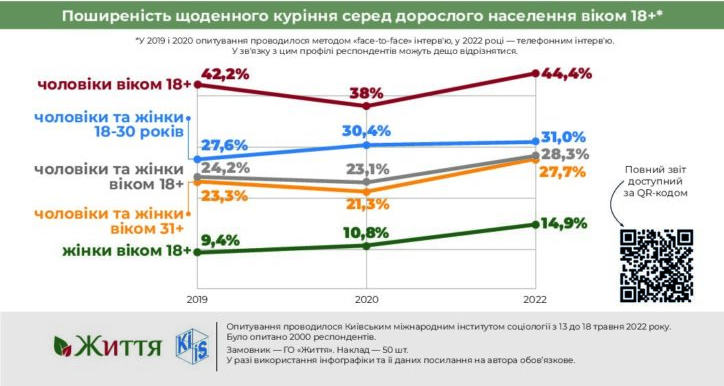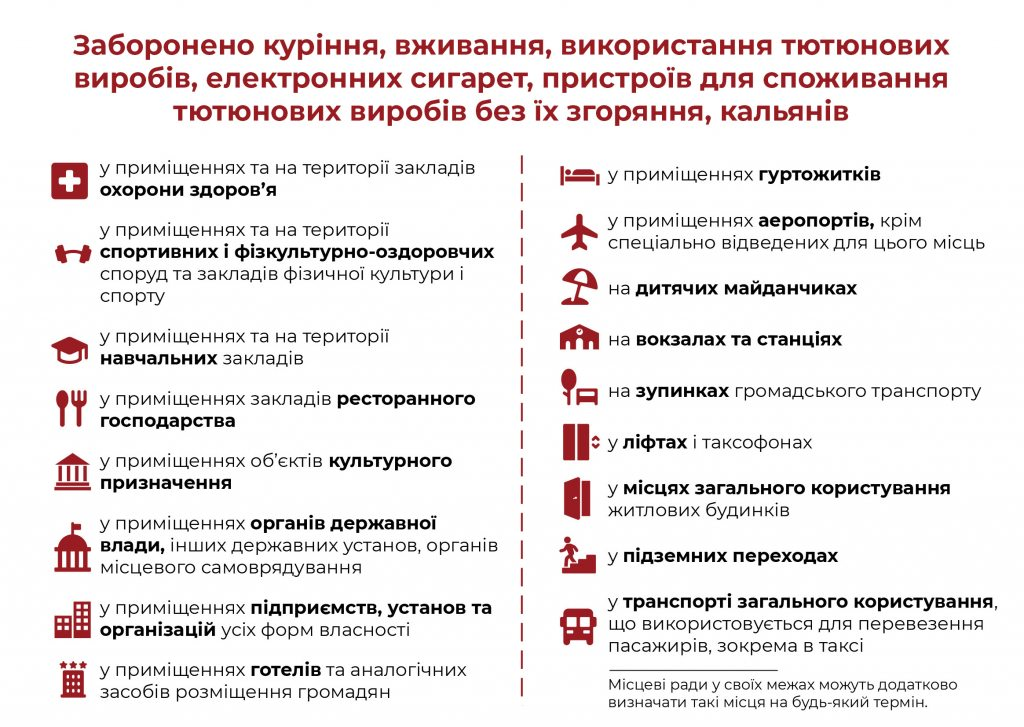
What is the problem?
The Kyiv International Institute of Sociology (KIIS) surveyed Ukrainians, showing that since 2019, the number of smokers among the country's adult population has gradually increased.

Despite a sharp decrease in the number of smokers among the adult population in 2020, in 2022, people started smoking again. According to sociologists who conducted the KIIS study, this growth is related to the war: a certain number of people returned to smoking due to stress. Also, sociologists assume that the changes may be related to the method of interviewing the interviewees—in telephone conversations this year, people may have answered questions more sincerely. In addition, smokeless tobacco products like IQOS or Glo have gained popularity in two years.
What is the solution?
Smoking was banned at the state level.
What new rules came into effect this summer?
Solving the problem of the increasing number of smokers among Ukrainians was undertaken at the legislative level. On December 16, 2021, the Ukrainian parliament, Verkhovna Rada, adopted Law No. 1978-IX, "On Amendments to Certain Laws of Ukraine Regarding Public Health Protection from the Harmful Effects of Tobacco," designed to accomplish several tasks at once:
- reduce the attractiveness of tobacco products;
- protect people from passive smoking.
The norms of the Law came into force gradually. The first changes came into effect on July 11, 2022, prohibiting not only smoking ordinary cigarettes but also any vapes, electronic cigarettes, herbal products for smoking, hookahs, IQOS, Glo, or any other similar heated tobacco devices in public places.

People's deputy Lada Bulak, the author of the draft law, explains:
"Our main task is to create conditions under which children and young people have no incentives to start smoking and give more incentives to stop using tobacco and nicotine to those who are already addicted. According to research, one in five teenagers aged 13–15 smokes electronic cigarettes. Children are the main target audience of the tobacco industry, which it preys on through aggressive marketing. And if Law No. 1978 prohibits the advertising of any electronic devices for smoking from next year, then, unfortunately, cigarette display will remain in the future."
Has the Law worked? Rubryka decided to check on its own. We conducted several experiments to determine how people feel about smoking, how aware they are of their rights, and whether the new rules can improve citizens' health.
Experiment No. 1: We check whether the law works fully and…
Immediately identify violators!
In the evening, we visited one of the famous bars in the center of Kyiv. A cocktail, a comfortable chair, and an unsurpassed panoramic view from the window—you don't want to go out "for a smoke break" on the cold street. Our experimenter takes out an electronic cigarette and slowly releases a thin stream of white smoke into the ceiling so that the server sees it. She notices this, heads across the hall to our table, and gently reminds us that smoking is not allowed in the room, but… unexpectedly directs us to the "smoking area" on the same floor.
What does the Law say about "smoking areas" on-premises, and where to complain?
The Anti-Tobacco Law has banned "smoking areas" for regular cigarettes since 2012! From June 11 this year, one can smoke neither IQOS, Glo, or anything else in them either.
Dmytro Kupyra, the executive director of the NGO Zhyttia, was indignant after hearing this story. He drew our attention to the fact that such a "smoking room" is a gross violation of the norms of the new Law.
By the way, there should be no "hookah bars" now, either. Article 13 of the Law prohibits hookah smoking on the premises of restaurants and in any smoking areas where drinks and food are served.

In case of violation of the ban on the use of any tobacco products, a public catering establishment faces a fine: 3,000 hryvnias for the first violation and 15,000 hryvnias for the second. The fine is also imposed on the smoker, although it is much smaller: 170 hryvnias is the maximum penalty.
Will the Law make people healthier?
To find the answer, we turned to a doctor methodologist at the Public Health Center of Ukraine's Ministry of Health, Otto Stoyka.
The doctor assures: the new norm will improve the health of everyone: both employees of establishments where it was possible to smoke before, and visitors, regardless of whether they smoke or not:
"I always tell smokers: banning tobacco smoking in public places will primarily improve their health. The issue of clean air is important for everyone, including smokers. If they smoke together in a closed room, they "add" even more harmful substances to each other. So this is universal health care," Otto explained.
The first effect observed from active smoking is concentrated smoke with various toxic substances, which the smoker will fully get. Second-hand smoke does not have such a negative effect on health, it has fewer harmful substances, so it is more difficult and longer to investigate this effect. According to Otto Stoyka, a striking example is a study in which scientists analyzed the health of women whose husbands smoked. Participants in the experiment were found to have 30% more cardiovascular diseases, including heart attacks, than women whose husbands do not smoke.
We asked an expert what the effects of smoking e-cigarettes are on those around you. In short, scientists are actively researching this issue:
"There are already studies on smoking electronic cigarettes and devices for heating tobacco, but not as numerous as on cigarettes. Electrically heated tobacco products entered the market around 2016. Compared to the studies that concern cigarettes, the number is not big."
The influence of the latest smoking lures on the environment of the smoker, according to the methodologist of the Public Health Center of the Ministry of Health, goes as complex:
"Of course, everything depends on the concentration, the way these substances are introduced into the body. But it is obvious to experts that any smoke that a person inhales is harmful, and indoors the mechanism is the same as with cigarettes. I think second-hand smoke is less harmful than e-cigarettes, but there is not much research. There may be other emphases on the harmfulness of smoking electronic cigarettes and devices for heating tobacco than it was with cigarettes. We know that e-cigarette smoking doesn't eliminate nicotine addiction, and these devices have even more toxic substances. For example, plastic in drains for heated tobacco devices also produces toxic smoke and clouds of oily substances, which are the basis of these gas stations, flavorings, and nicotine, harm health."
The doctor explained that by immediately banning all the latest nicotine devices, lawmakers did not wait for research. It means being on the lookout because approximately 60 years have passed since the beginning of research on the adverse effects of nicotine on the human body until the first bans and less than ten years from the appearance of the first devices for heating tobacco to the first restrictions.
Experiment #2: Are people aware of their rights to tobacco-free air?
A sign on the transparent wall of one of the buildings of a colossal business center in the capital says: smoking closer than 7.5 meters from the buildings on the territory is prohibited. However, there are such signs in many places, and people often neglect them. Our experimental smoker stands in the passageway under the building and starts puffing from an electronic cigarette.
Several people pass by; everyone is busy with their affairs, and they ignore the smoker, but then a couple of colleagues stop, and the man remarks: "There are two specially designated places for smokers on the territory." He politely explains how to find a "smoking area," but there is still a harshness to his voice: this person is ready to defend his right to clean air from nicotine. By the way, to the smoker's remark that the sign prohibits the smoking of traditional cigarettes and not electronic cigarettes, he replied that the rules are the same for everyone.
The passerby we met behaved quite predictably: 55% of respondents in the KIIS study would have done the same.
"This survey was conducted even before the introduction of the first regulations, which came into force in July this year. Ukrainian society made a consensus—we do not smoke any tobacco or nicotine products on the premises," MP Lada Bulak adds.

We do not always realize the real threat of passive smoking to our health. But remember that the Law guarantees your right to a smoke-free environment. Do not allow yourself to be "smoked over."
What can you do after identifying the violator?
- Politely ask the smoker to stop the violation (if you feel safe).
- Contact the administration of the institution or establishment with a demand to stop the violation.
- Contact the police at number 102.
- File a complaint to the State Production and Consumer Service for an establishment whose administration creates conditions for smoking or otherwise violates the norms of smoke-free legislation.
- Post a no-smoking sticker (for example, in a designated entrance area). You can download the printing layout here.
Experiment #3: Are cigarettes still attractive to young people?
To determine if the new bans affect teenagers, we set out on one of the most challenging experiments: looking for schoolchildren with cigarettes or any kind of them. Not an easy task!
Nevertheless, we find three young people with disposable electronic cigarettes near the shopping center. After persuasion in complete anonymity, we learn the following:
- cigarettes are unpopular among teenagers because of the unpleasant smell and the possibility of "being outed" in front of their parents;
- buying something like IQOS is expensive for a teenager; besides, you have to ask someone to purchase sticks constantly;
- But disposable aromatic electronic cigarettes are popular among young people: according to teenagers, although they are more expensive than cigarettes, they taste better; moreover, parents do not find out you're smoking; you can smoke even at home. One can order electronic cigarettes on the Internet, and no one asks a teenager for his passport during such orders.
And this is a huge problem that needs to be solved right now.
Executive Director of the NGO Zhyttia Dmytro Kupyra says: according to statistics, 80% of smokers made their debut with flavored cigarettes. There has yet to be data on disposable electronic cigarettes, but now it is, in fact, an analog of such cigarettes with various sweet fruit flavors.
"E-cigarettes with liquids are the biggest evil of all," another respondent, Oleksii, with an electronic device in his hands, tells us. Previously, the guy did not smoke tobacco; he did not like the smell and taste, but with the advent of "electronics," the guy became addicted to nicotine.
But the pleasant taste and smell are only some of it: we have already written about how teenagers and young people are enticed to smoke in at least seven different ways.
What does the new law do to discourage children from smoking?
The adopted comprehensive anti-tobacco law No. 1978 implements into Ukrainian legislation the provisions of Directive 2014/40/EU "On the approximation of laws, subordinate legal acts and administrative provisions of the member states regarding the production, presentation, and sale of tobacco products."
The author of the law, People's Deputy Lada Bulak, explains:
"The importance of Directive No. 2014/40/EU is that its rules prevent or impose restrictions on the use of marketing technologies by the tobacco industry aimed at increasing the attractiveness of tobacco products, electronic cigarettes, sales promotion and creating the illusion of less harm".
In particular, the law provides:
- an increase of medical warnings on the packaging of tobacco products for smoking by up to 65% with graphic warnings about the consequences of tobacco use on both sides of the pack—the ban will come into effect on January 11, 2024;
- the ban on the use of flavoring additives (sweets, fruits, spices, etc.) in the production of cigarettes and liquids for electronic cigarettes—it will come into effect in 2024. The debut of smoking in children most often occurs precisely with flavored cigarettes (80%);
- prohibition of any advertising of devices for heating tobacco, electronic cigarettes, and their liquids—from July 2023;
- the ban on smoking cigarettes for heating together with electronic devices in places defined by law and in all public and workplaces on the same level as other tobacco products, hookahs, and electronic cigarettes—effective from June 11 of this year.
This should work. According to the Kyiv School of Economics, a ban on displaying cigarettes can reduce the likelihood of starting or continuing to smoke by 23%. It is logical to predict that this will apply to electronic cigarettes and heated tobacco devices. In addition, a secondary result of the ban on displaying will be a reduction in the costs of treating diseases caused by tobacco smoking.
The deputy also adds:
"Scientific studies show that real illustrations of diseases on cigarette packs save lives. Warnings raise people's awareness of the dangers of tobacco use and encourage smokers to quit. In addition, smokers claim that it is from cigarette packs that they most often learn about the dangers of smoking, compared to any other source of information."
Doctor Otto Stoyka, who specializes in behavioral risk factors, says that such measures are mainly aimed at young smokers and those who hesitate:
"Most people start smoking before the age of 20–25, try different types of devices, don't have a favorite product, don't have dependencies. This is unlikely to happen to smokers who already have an addiction: people with lung disease smoke even in hospitals. But young people, who only look closely at the product, may think about the damage. It also works well in cases where a person hears about the dangers of smoking from all sides. For example, I heard from a doctor, and my relatives reminded me, and I saw a picture. What else should be done is to change the images on the packaging so that a person doesn't get a habit, and also put on cigarette packs a telephone helpline with help to quit smoking; they have been doing this in Canada since the 80s."
In Ukraine, an analog of such a solution already exists: we have a national website, I Quit Smoking, where you can find information about the effects of smoking on health, get advice and learn how to help a smoker.
The following essential steps, per the WHO Framework Convention on Tobacco Control, might be the ban on the display of tobacco and nicotine products in places of trade and the introduction of standardized packaging of tobacco products, valid in more than 20 countries of the world. If you remove the display in the store and introduce an unattractive pack of cigarettes, the legislator Lada Bulakh is sure that in a few years, the number of smokers in Ukraine will significantly decrease.








